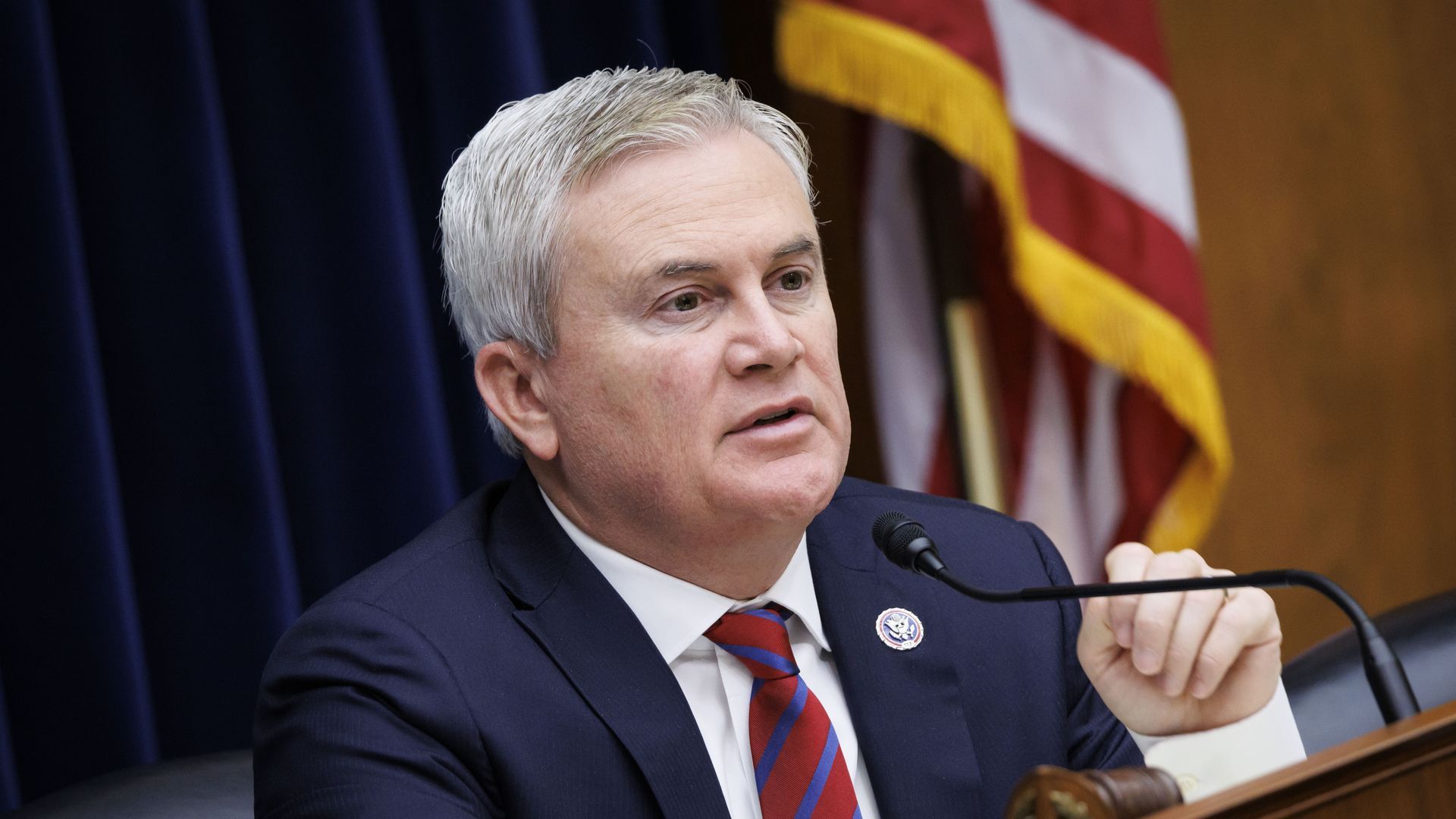Plus, Comer seeks to declassify DOE's assessment | Tuesday, February 28, 2023
| | | | | | | Presented By PhRMA | | | | Axios Vitals | | By Tina Reed · Feb 28, 2023 | | Good morning, Vitals readers. Today's newsletter is 979 words or a 3½-minute read. Situational awareness: President Biden is set to continue hammering on Republicans during a planned speech in Virginia today for favoring cuts to health programs with the debt ceiling fight looming. - White House officials said his comments will follow up statements in the State of the Union about GOP threats to Medicare and Social Security, this time focusing on Republicans' designs on the Affordable Care Act and Medicaid.
| | | | | | 1 big thing: New Alzheimer's drug renews push for Medicare coverage |  | | | Illustration: Brendan Lynch/Axios | | | | The Biden administration's decision last week to continue restricting Medicare coverage for a class of Alzheimer's drugs has angered some Republicans and renewed a thorny debate over when seniors should have access to new treatments — and under what conditions, Axios' Caitlin Owens writes. Why it matters: The issue raises fundamental questions about government discretion and how much data is needed before making a drug available to the public. - But it's an especially fraught debate with Alzheimer's — a degenerative disease with no cure that that slowly destroys memory and thinking skills.
State of play: Medicare administrators set parameters for covering a class of Alzheimer's drugs last year, after Biogen's Aduhelm received accelerated approval under unprecedented circumstances from the FDA. - Many experts argued there wasn't adequate data to prove the drug worked and a congressional investigation found that the FDA didn't follow its own guidance and collaborated inappropriately with the drugmaker.
- The FDA in January green-lighted another Alzheimer's drug with a similar mechanism, Eisai and Biogen's Leqembi, through accelerated approval. This time, scientists generally agree that the clinical trials were well conducted, even if they question the real-world efficacy of the drug.
- The Alzheimer's Association asked CMS to reconsider its decision in light of circumstances. Last week, however, CMS turned down the request and said it would maintain the restrictions and only pay for the class of drugs in specific settings.
The big picture: Although the focus is on Medicare coverage given the demographics of most Alzheimer's patients, the agency's decision has also been viewed as a signal to commercial insurers. What we're watching: It's unclear whether House Republicans will bring up legislation on the subject, which could garner bipartisan support. Members of the House and Senate from both parties had recently urged CMS to reconsider the policy. For more on how members of Congress are approaching coverage of Alzheimer's drugs, subscribe to Axios Pro. Use code POLICY100 which gives you $100 off. |     | | | | | | 2. Comer seeks to declassify DOE's assessment |  | | | Comer at a Feb. 7 hearing. Photo: Ting Shen/Bloomberg via Getty Images | | | | House Oversight Committee Chair James Comer said Monday he'll try to get a Department of Energy assessment that reportedly concluded COVID-19 may have originated from a lab leak in China declassified and made public, Axios' Victoria Knight reports. Why it matters: It signals an escalation of the House GOP investigative efforts into the origins of COVID — and Comer says it will bring transparency to the classified report if successful. |     | | | | | | 3. Medical claims increasing in complexity |  Data: Kaiser Family Foundation analysis of Merative MarketScan data; Note: Includes enrollees with private insurance coverage from large employers; Chart: Simran Parwani/Axios Visits to emergency departments and physicians' offices have grown more complex and costly over time — at least based on the way providers are billing, per a Peterson-KFF Health System Tracker report released Monday. What they're saying: "There is a trend towards visits being billed at higher levels over time," the authors wrote. "For consumers who bear the marginal costs of more expensive services — those with co-insurance or deductibles — this trend impacts out-of-pocket costs in addition to overall health system costs." By the numbers: The overall number of claims at the highest two levels of complexity in outpatient settings such as office, urgent care, and emergency departments grew from 22% in 2004 to 43% in 2021. - For the emergency department it grew from 33% in 2004 to 60% in 2021.
Between the lines: The report also looked at specific conditions, such as urinary tract infections, which were unlikely to be worsening over time and where their presence with another disease have a smaller impact. - Moderately complex claims accounted for 54% of emergency department claims and 67% of all outpatient office claims for UTIs in 2004. Higher complexity claims made up 26% and 14% in those settings, respectively.
- Moderate complexity UTI claims accounted for only 31% of emergency department claims and 57% of outpatient office claims in 2004. The number of higher complexity claims in those settings jumped to 66% and 37%, respectively, by 2021.
|     | | | | | | A message from PhRMA | | Patients are frustrated | | |  | | | | New data from IQVIA reveal patients with deductibles and coinsurance are more likely to abandon their medicines than patients with copays. The reason: Insurers and their PBMs shift the costs of covered medicines onto their patients. That's not fair. Learn more. | | | | | | 4. Debate over medical conference meeting sites | | Medical societies should move their planned conferences or meetings out of states with the abortion bans, a group of medical experts wrote in JAMA Internal Medicine on Monday. Why it matters: Companies and non-profit organizations have grappled with the question of holding professional events — which often draw thousands of thousands of people to a single city — in states with restrictive abortion laws in the wake of last year's Dobbs decision. - That debate over boycotts is heightened for the medical community, which can send a message about its values regarding health access and redirect where they spend their money, argue Cary Gross, director of COPPER Center for cancer research at the Yale School of Medicine and Katherine Kraschel, the executive director of the Solomon Center for Health Law and Policy at Yale.
- As well: "It is inappropriate to hold medical conferences in locations that potentially place the health and safety of attendees — many of whom are of child-bearing age — at risk," they wrote in the piece, which was also co-authored by former White House health policy adviser Ezekiel Emanuel.
The other side: "The people most affected by a boycott will be some of the same people most in need of abortion care and who are therefore already most harmed by bans," read a dueling opinion led by Lisa Harris, associate chair of obstetrics and gynecology at Michigan Medicine. - The piece, co-authored by Jamila Perritt, the CEO of Physicians for Reproductive Health and Bhavik Kumar, a physician at Planned Parenthood Gulf Coast in Texas suggested taking alternative measures.
- For instance, they recommended, medical groups could continue to hold conferences in states with abortion bans, but only work with vendors whose corporate policies support abortion rights.
|     | | | | | | 5. Catch up quick | | 👉 Only 5.7% of U.S. doctors are Black, and experts warn the shortage harms public health. (CNN) 🍫 An artificial low-calorie sweetener may raise heart attack and stroke risk. (Daily Mail) 🦠 The next deadly pandemic is just a forest clearing away. But we're not even trying to prevent it. (ProPublica) 💰 When "out of network" doesn't quite mean out of network. (KHN) |     | | | | | | A message from PhRMA | | Data shows insurers and their PBMs shift costs to patients | | |  | | | | Costly OOP expenses tied to deductible and coinsurance requirements are a leading concern for patients with commercial insurance. These harmful practices put in place by insurers and pharmacy benefit managers (PBMs) are even causing patients to abandon their medicines. Learn more. | | | | Have a news tip? Just reply to this email. Did someone forward this email? Subscribe here. Thanks for reading, and thanks to senior health care editor Adriel Bettelheim and senior copy editor Bryan McBournie for the edits. |  | | Dive deeper into the future of health care | | | | | | Axios thanks our partners for supporting our newsletters.
Sponsorship has no influence on editorial content. Axios, 3100 Clarendon Blvd, Arlington VA 22201 | | | You received this email because you signed up for newsletters from Axios.
To stop receiving this newsletter, unsubscribe or manage your email preferences. | | | Was this email forwarded to you?
Sign up now to get Axios in your inbox. | | | | Follow Axios on social media:    | | | | | |
No comments